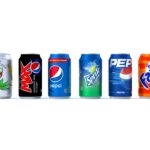Sunny Delight, popularly known as SunnyD, remains a well-known brand, especially in the U.S., but its popularity has fluctuated over the years.
It’s a citrus-flavored drink that competes with both sugary beverages and healthier alternatives.
I was astonished to find out that a boy in my son’s fifth-grade class drinks it daily for lunch!
So, today, I thought I’d look into how unhealthy this drink is and how it can impact our health.
Let’s start with its nutritional value.
Added Sugars
The sugar content of the US and UK versions is very different. In the US, high fructose corn syrup and Splenda are added to give more sweetness besides that coming from the juice concentrates.
For more on the dangers of consuming high fructose corn syrup, please check this article: https://grosseating.com/the-unhealthy-reality-of-high-fructose-corn-syrup-in-soda/
In the UK version of SunnyD, the sweetness comes from a higher concentration of juices (13%) and two added artificial sweeteners: Splenda and Acesulfame K (also known as Sweet One).
| US (240 ml) | UK (250 ml) | |
| Calories | 60 | 20 |
| Total Carbohydrates | 16 gms | 3.8 gms |
| Total Sugars | 14 gms | 3.8 gms |
| Added Sugars | 12 gms |
One 8-oz. (240 ml) serving of SunnyD in the U.S. has 16 grams of total carbohydrates, including 14 grams of sugar and 12 grams of added sugar in the form of high fructose corn syrup and Splenda.
This is a significant portion (24% DV) of the daily recommended limit for a 2000-calorie diet and can lead to multiple problems like weight gain, cavities, and an increased risk of chronic diseases like type 2 diabetes if consumed regularly.
In the UK, the total carbohydrate content is 3.8 grams, and there are only 20 calories per 250 ml, including added sugars.
Low in Natural Juice
SunnyD typically contains less than 5% real juice in the U.S.; in fact, if you read the ingredients, it says
2% OR LESS OF: CONCENTRATED ORANGE JUICE, CONCENTRATED TANGERINE JUICE, CONCENTRATED APPLE JUICE, CONCENTRATED LIME JUICE, CONCENTRATED GRAPEFRUIT JUICE, CONCENTRATED PEAR JUICE, CITRIC ACID.
(“Tangy Original – SunnyD,” 2024)
It is made up of concentrates from a gazillion juices. This means it not only lacks the fiber, vitamins, and antioxidants that come from natural fruit juices but is also sweeter.
When a juice concentrate is made, it results in a very sweet syrup that loses some of the nutrients in the original juice.
The label on the U.K. version of SunnyD says,
“Juices from Concentrate (13%) (Orange, Mandarin, Red Grapefruit, Lime). “
(“Sunny Delight Florida Citrus Juice Drink 1 Litre,” 2024)
Vitamin Content
In the United States, Vitamin C and Thiamin (Vitamin B1) are the only vitamins added to it. However, the UK version has added Vitamins E and D.
Added Chemicals
SunnyD in the US contains a long list of artificial flavors, colors, and preservatives:
- MODIFIED CORNSTARCH,
- CELLULOSE GUM,
- SODIUM HEXAMETAPHOSPHATE,
- POTASSIUM SORBATE TO PROTECT FLAVOR,
- YELLOW #5,
- YELLOW #6,
- CALCIUM DISODIUM EDTA TO PROTECT COLOR.
All these chemicals are added to preserve the color and give it texture. Personally, I do not think it looks appealing even after the addition of all of these additives.
It seems very artificial, making me wonder how it would look without these chemicals enhancing the color and texture.
Please read my article on the use of artificial colors in foods here: https://grosseating.com/the-use-of-artificial-colors-in-our-food-supply/
In the UK, the color is achieved by adding beta-carotene, a natural pigment found in fruits and vegetables and a precursor for Vitamin A. No artificial colors are added.
Canola Oil In SunnyD???
Yes, you read that correctly! SunnyD in the United States contains canola oil.
As if there weren’t enough ingredients to disgust a person, here is one more.
Why it is added is beyond me, except that if I were to guess, it is used as an emulsifying and stabilizing agent to keep all the other ingredients together and ensure the drink has a smooth and uniform consistency.
Most natural fruit juices don’t need emulsifiers like canola oil because they lack the synthetic additives and stabilizers found in drinks like SunnyD.
Why it’s added to the U.S. and NOT in the U.K. is another question that needs answering.


The Verdict
Other than being a good source of added Vitamin C, both versions are far from being in the category of ‘natural juices.’
They are just a source of empty calories and food additives, providing nothing of nutritional significance and only loading you up on sugar.
Please avoid them at all costs and always go for natural fruit juices instead.




